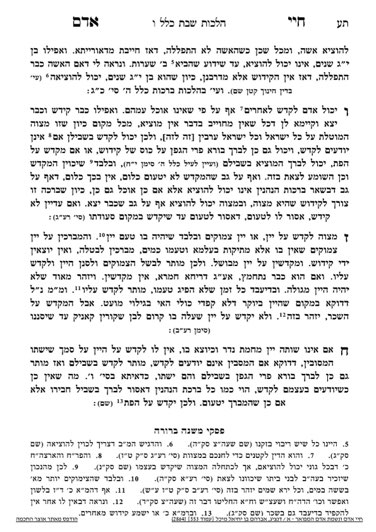The current series, which will cover Maariv on Friday night and Kiddush, is available for sponsorship. Please contact Rabbi Reingold for more information.
We are continuing in siman 7, where the Chayei Adam discusses the halachos of gilui. The Chayei Adam wrote that one should be makpid not to use wine for kiddush which has a problem with gilui. Additionally the Chayei Adam writes that one should not use wine which is old and has developed a white film on top of it. One should remove the film before making kiddush. (The Chayei Adam is not referring to the white foam which gathers from carbonated juices or the like.)
Siman 8 discusses a person who made a neder not to drink wine. Such a person should not recite kiddush themselves, but rely on another person to recite it for him. Once a person recites kiddush, a melo lugmav of the kos shel bracha must be consumed. Preferably, the one who makes the kiddush should drink melo lugmav. Bedieved, we may include other people in the requirement to drink molei lugmav. Either way, it is not appropriate that only others should drink and the person who made the kiddush does not drink anything at all.
In siman 9, the Chayei Adam writes that if one does not have wine, they should make kiddush on bread. Friday night, a person washes hands, recites al netilas yadayim, picks up the bread, and recites the paragraph of vayechulu. While holding the bread, he will recite hamotzi and the rest of the regular Shabbos kiddush. Finally, he will break into the bread.
The Chayei Adam writes that it is preferable to make kiddush over bread rather than beer or whisky. (Similar to the way the Indians called whisky, “fire water”, we call it yayin saraf, or “fire wine”.) This is true even if the liquid in question is chamar medina, since not all poskim agree that one may use it. Chazal instituted specifically that kiddush should be recited over wine, so some poskim hold one is not yotzei with other beverages. Therefore, it is preferable to use bread.
When it comes to havdalah, one cannot use bread, and one may use chamar medina.
We need to define chamar medina. It literally translates to “wine of the neighborhood”. It used to be that there was little wine available, so people would replace situations which required wine with an agreed-upon beverage. Thus, since normally when people get together, people drink wine, wine is the paradigmatic chamer medina. If no wine is available, and people use beer instead, beer becomes chamer medina, and so on. It also has to be a beverage which people do not just drink when they are thirsty, but serves as a social drink for gatherings. Thus, since people do not get together to drink, say, orange juice, it is not considered chamar medina, but coffee or beer would apply to this concept.
It is important to note that the poskim are clear that it only applies when there is no wine available.
Summary
- One should not use wine which has an issue of gilui or a white film on top of it.
- If one made a neder not to drink wine, they must find someone else to help them fulfill their obligation
- One should not rely on chamer medina for kiddush, but should prefer bread over chamer medina.
- One may use chamer medina for havdalah when no wine is available.



